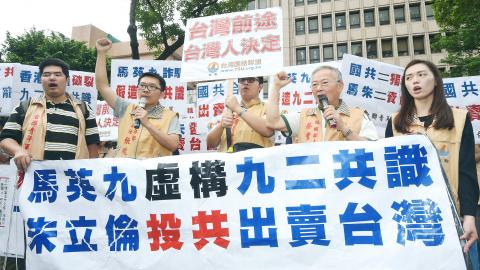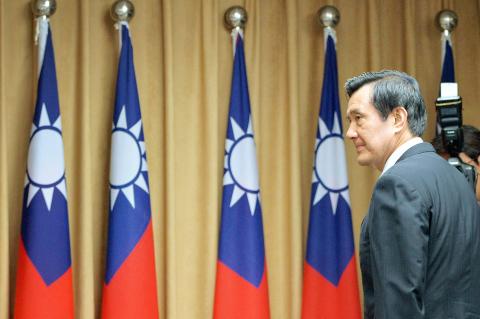Echoing Chinese President Xi Jinping’s (習近平) description of consequences that Xi said would follow any change to the political formula that endorses the “one China” principle — the so-called “1992 consensus,” President Ma Ying-jeou (馬英九) yesterday said that the “political basis” for cross-strait interaction is “irreplaceable.”
Cross-strait relations prosper when they go along with the “1992 consensus,” wither when they part from it and decline into chaos when they go against it — as evidenced by the development of the cross-strait relationship over the past 23 years, Ma said in a speech at the Mainland Affairs Council.
Ma’s conclusions echoed Xi’s recent statement that challenging the “1992 consensus” would “trigger an earthquake and topple hills.”

Photo: Wang Min-wei, Taipei Times
Ma read a 4,650-word statement about the “1992 consensus,” titled “Peace and Prosperity: The Common Future of Cross-Strait Relations.”
Officials said the statement covered the origins and history of the phrase, and to tally the effects it has had on cross-strait ties.
The “1992 consensus,” a term former Chinese Nationalist Party (KMT) lawmaker Su Chi (蘇起) admitted making up in 2000 when he was head of the council, refers to a tacit understanding between the KMT and the Chinese government that both sides of the Taiwan Strait acknowledge that there is “one China,” with each side having its own interpretation of what “China” means.

Photo: CNA
Ma listed in the speech the “challenges” facing the adoption and implementation of the consensus and the various initiatives advocated, separately, by former Democratic Progressive Party (DPP) chairman Frank Hsieh (謝長廷), DPP Chairperson Tsai Ing-wen (蔡英文) and Taipei Mayor Ko Wen-je (柯文哲) as potential alternative frameworks for engaging with Beijing.
None of the proposals is a substitute for the “1992 consensus,” since “they were neither endorsed by Taiwanese society nor by [China],” Ma said.
However, the president said he “viewed positively” recent statements by Tsai and Ko.
Tsai has said that the DPP would maintain the “status quo” in cross-strait ties, examine cross-strait agreements under a supervision framework and continue negotiations if it returns to power.
Ko has proposed a “2015 point of view,” which respects cross-strait history and all of the agreements signed and agreed upon, as well as the “four mutuals”: mutual awareness, mutual understanding, mutual respect and mutual cooperation.
Nevertheless, “the proposals by Chairperson Tsai and Mayor Ko shun the issue of ‘one China,’” Ma said.
He said that his administration has made it “crystal clear” that the “one China” in the “1992 consensus” means the Republic of China (ROC).
Ma then posed two questions to Tsai, saying that Tsai, as her party’s nominee for next year’s presidential election, is duty-bound to provide unequivocal answers.
“First, what is the ‘status quo?’ Is it the policy of ‘no independence, no unification and no use of force,’ in line with the ROC Constitution and the peaceful development in cross-strait relations made possible by the ‘1992 consensus’ on ‘one China,’ with each side having its own interpretation?” Ma said.
“Second, how should the ‘status quo’ be maintained,” he said.
The “1992 consensus” is not a cure-all, but is the formula that can resolve problems hindering cross-strait relations — mainly disagreement over “one China” — maintain the “status quo” and bring peace and prosperity to the relationship, Ma said.
The consensus has provided the political basis that both sides willingly accepted, Ma said.
In interpreting what “one China” is in the formula, “we have to abide by the ROC Constitution,” Ma said. “Of course, the ‘one China’ for us is the ROC, not ‘two Chinas,’ ‘one China, one Taiwan’ or ‘Taiwanese independence.’”
Critics have said the KMT’s version of the “1992 consensus” is wishful thinking, as Beijing has never accepted the existence of the ROC and has been intolerant of symbols of the ROC’s sovereignty.
Chinese officials, including Xi, have said “the mainland and Taiwan belong to the same ‘one China,’” calling it a “core element” of the “1992 consensus” without mentioning “respective interpretations.”
Ma said the question of what the “one China” is “should be set aside.”
“Surely this is an issue that needs to be addressed, but in the future, not now. We must spend time and energy advancing exchanges, rather than interpreting what ‘one China’ is. Otherwise, we would be derailed in efforts to deal with other issues,” Ma said.
His visit to the council came ahead of New Taipei Mayor and KMT Chairman Eric Chu’s (朱立倫) planned trip to China and a meeting with Xi.
It was the second time Ma made such a visit to the council; the first was in July 2008, two months after he took to office.
Ma said yesterday’s visit was timed to commemorate the first high-level cross-strait meeting, which took place 22 years ago yesterday in Singapore, as well as a meeting between then-KMT chairman Lien Chan (連戰) and then-Chinese president Hu Jintao (胡錦濤) in Beijing 10 years ago.
“Chu has told me that he wished to consolidate and deepen the ‘1992 consensus’ [in his meeting with Xi] and incorporate the formula in Taiwan’s participation in regional economic integration,” Ma said.
“Our views on those issues are exactly identical,” he said.

The US government has signed defense cooperation agreements with Japan and the Philippines to boost the deterrence capabilities of countries in the first island chain, a report by the National Security Bureau (NSB) showed. The main countries on the first island chain include the two nations and Taiwan. The bureau is to present the report at a meeting of the legislature’s Foreign Affairs and National Defense Committee tomorrow. The US military has deployed Typhon missile systems to Japan’s Yamaguchi Prefecture and Zambales province in the Philippines during their joint military exercises. It has also installed NMESIS anti-ship systems in Japan’s Okinawa

‘WIN-WIN’: The Philippines, and central and eastern European countries are important potential drone cooperation partners, Minister of Foreign Affairs Lin Chia-lung said Minister of Foreign Affairs Lin Chia-lung (林佳龍) in an interview published yesterday confirmed that there are joint ventures between Taiwan and Poland in the drone industry. Lin made the remark in an exclusive interview with the Chinese-language Liberty Times (the Taipei Times’ sister paper). The government-backed Taiwan Excellence Drone International Business Opportunities Alliance and the Polish Chamber of Unmanned Systems on Wednesday last week signed a memorandum of understanding in Poland to develop a “non-China” supply chain for drones and work together on key technologies. Asked if Taiwan prioritized Poland among central and eastern European countries in drone collaboration, Lin

ON ALERT: Taiwan’s partners would issue warnings if China attempted to use Interpol to target Taiwanese, and the global body has mechanisms to prevent it, an official said China has stationed two to four people specializing in Taiwan affairs at its embassies in several democratic countries to monitor and harass Taiwanese, actions that the host nations would not tolerate, National Security Bureau (NSB) Director-General Tsai Ming-yen (蔡明彥) said yesterday. Tsai made the comments at a meeting of the legislature’s Foreign Affairs and National Defense Committee, which asked him and Minister of National Defense Wellington Koo (顧立雄) to report on potential conflicts in the Taiwan Strait and military preparedness. Democratic Progressive Party (DPP) Legislator Michelle Lin (林楚茵) expressed concern that Beijing has posted personnel from China’s Taiwan Affairs Office to its

BACK TO WORK? Prosecutors said they are considering filing an appeal, while the Hsinchu City Government said it has applied for Ann Kao’s reinstatement as mayor The High Court yesterday found suspended Hsinchu mayor Ann Kao (高虹安) not guilty of embezzling assistant fees, reducing her sentence to six months in prison commutable to a fine from seven years and four months. The verdict acquitted Kao of the corruption charge, but found her guilty of causing a public official to commit document forgery. The High Prosecutors’ Office said it is reviewing the ruling and considering whether to file an appeal. The Taipei District Court in July last year sentenced Kao to seven years and four months in prison, along with a four-year deprivation of civil rights, for contravening the Anti-Corruption